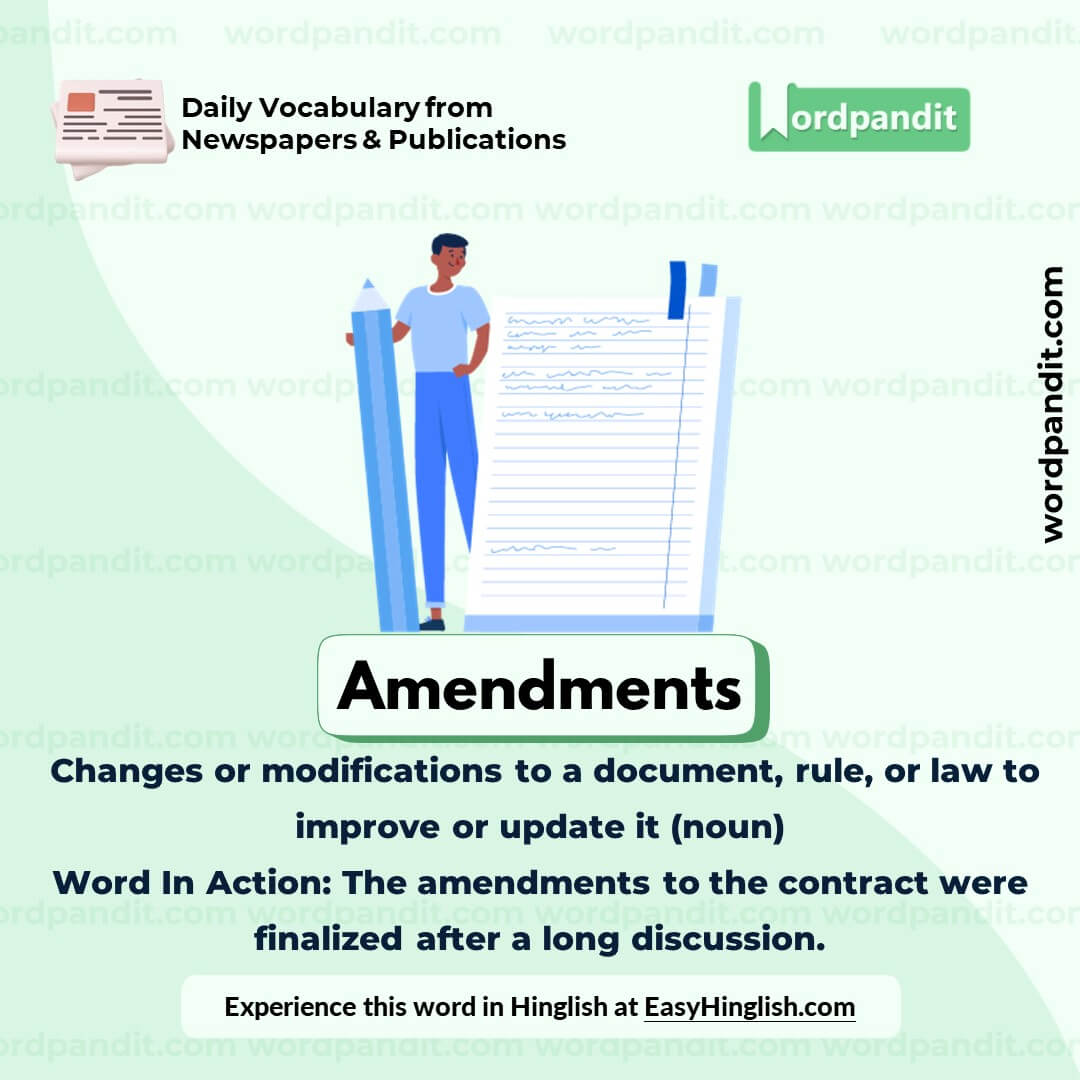Daily Vocabulary from Indian Newspapers and Publications
Welcome to Wordpandit’s Indian Vocabulary Hub
At Wordpandit, we understand the importance of staying rooted in the local context while expanding your language skills. This section focuses on enriching your vocabulary with words and phrases drawn from India’s leading newspapers and publications, ensuring you're learning vocabulary that is practical, relevant, and uniquely Indian.
Why Indian Sources Matter
We believe that the best way to master any language is by immersing yourself in local content. That’s why we carefully curate vocabulary from top Indian publications, including:
- The Hindu
- The Times of India
- The Economic Times
- Hindustan Times
- Live Mint
- The Indian Express
- And many others...
Stay Updated, Stay Relevant
With daily updates from Indian news sources, you’ll be consistently learning words that reflect the trends and shifts in Indian society and culture. Our focus is to provide vocabulary that enhances your understanding of the language in an Indian context.
How Wordpandit Supports Your Goals
Whether you’re preparing for exams, aiming to improve your professional communication, or simply want to stay connected with the latest Indian vocabulary, Wordpandit is here to guide you every step of the way.
Learn with a Practical Approach
Our interactive learning methodology includes real-world examples, engaging activities, and context-specific usage to ensure that every word becomes part of your active vocabulary.
Dive into Indian Vocabulary Today!
Why Choose Wordpandit?
Practical Learning: Focus on words you'll actually encounter in real-world reading, enhancing your comprehension and communication skills.
Diverse Content: From current affairs to scientific breakthroughs, our varied sources expose you to vocabulary across multiple domains.
Effortless Integration: Make Wordpandit a part of your daily routine. Just a few minutes each day can significantly boost your lexicon over time.
Your Path to Vocabulary Mastery
- Visit our Daily Vocabulary section regularly
- Explore new words and their usage in context
- Practice incorporating these words into your own writing and speech
- Track your progress as your vocabulary expands
Start Your Journey Today
Embark on your vocabulary enhancement journey with Wordpandit. By consistently engaging with our daily posts, you'll build a robust vocabulary that serves you well in academic, professional, and personal contexts.
Remember, a word a day keeps linguistic limitations at bay. Make Wordpandit your daily companion in the quest for vocabulary excellence!
WORD-1: Amendments
Context:
"On Tuesday, Congress filed a writ petition in the Supreme Court challenging the recent amendments to the Conduct of Election Rules, 1961." - The Wire
Explanatory Paragraph:
The word "amendments" refers to formal changes or additions made to laws, documents, or rules. It highlights the process of revising or improving an existing structure or system, often to address new challenges, correct errors, or update content.
Meaning: Changes or modifications to a document, rule, or law to improve or update it (noun).
Pronunciation: uh-mend-muhnts
Difficulty Level: ⭐⭐⭐ Intermediate
Etymology: Derived from the Old French "amendement," which means "improvement" or "correction," and from the Latin "emendare," meaning "to correct."
Synonyms & Antonyms:
Synonyms: Revisions, modifications, corrections, improvements
Antonyms: Stagnation, permanence, status quo
Usage Examples:
- The amendments to the company policy will be effective from January 1.
- The Constitution of India has undergone several amendments to address changing societal needs.
- The teacher suggested amendments to improve the clarity of the student's essay.
- The recent amendments to the trade agreement have sparked debates among economists.
Cultural Reference:
"The First Amendment to the United States Constitution guarantees freedom of speech, religion, and the press." - A foundational principle in American democracy.
Think About It:
Why do you think amendments are necessary for laws and policies to remain effective over time?
Quick Activity:
List three examples of amendments (legal, policy, or personal) that have significantly impacted history or your life. Briefly explain their importance.
Memory Tip:
Think of "amendments" as "adding mend" to something—making it better or fixing it!
Real-World Application:
The process of making amendments is essential in governance, as it ensures laws can adapt to societal changes, technological advancements, and cultural evolution.
WORD-2: Disrepute
Context:
"Public employment, and all other similar disreputable areas which allow 'we the people' to suck the coffers of the realm to the detriment of those exceptional sons (not many daughters there) of Bharat who sleep not a wink in pursuit of our greatness and glory." - The Wire
Explanatory Paragraph:
The term "disrepute" refers to a state of being held in low regard or lacking respect. It is often associated with actions or behaviors that tarnish the reputation of an individual, group, or institution. In the context above, it highlights areas perceived as corrupt or dishonorable.
Meaning: The state of being held in low esteem or lacking respect (Noun).
Pronunciation: dis-rih-PYOOT
Difficulty Level: ⭐⭐⭐ Intermediate
Etymology: Derived from the Latin prefix "dis-" meaning "lack of" or "apart," and "repute," which originates from the Latin word reputare, meaning "to think over" or "consider."
Synonyms & Antonyms:
Synonyms: Dishonor, disgrace, shame, infamy
Antonyms: Respect, esteem, honor, prestige
Usage Examples:
- The company fell into disrepute after its unethical practices were exposed.
- His actions brought disrepute to the organization he represented.
- The politician's involvement in the scandal led to years of disrepute for his party.
- The practice of bribery has thrown the institution into disrepute.
Cultural Reference:
In the realm of sports, athletes found guilty of doping often bring disrepute not only to themselves but also to their teams and nations, tarnishing their legacy.
Think About It:
Can an individual or institution recover from disrepute? What steps are necessary to restore trust and reputation?
Quick Activity:
Identify an instance where an organization overcame disrepute. Write a few sentences about the strategies they used to regain public trust.
Memory Tip:
Think of "disrepute" as the opposite of "reputation." If your reputation is harmed, you fall into disrepute.
Real-World Application:
The concept of disrepute is significant in law, ethics, and public relations. Avoiding actions that can damage one's reputation is crucial for maintaining personal and professional credibility.
WORD-3: Collaborate
Context:
"The whole idea has been to drive one engine forward to 2047, yielding mind-boggling technological modernity, and the second engine backward to 1947 to yield a cultural nationhood in collaborative and uncritical sync with such modernity." - The Wire
Explanatory Paragraph:
The word "collaborate" means working together with others to achieve a shared goal or purpose. It often implies mutual effort, cooperation, and teamwork. In the context of the sentence, "collaborative sync" highlights the seamless cooperation between two contrasting goals to create harmony.
Meaning: To work jointly with others or together, especially in an intellectual endeavor (Verb).
Pronunciation: kuh-LAB-uh-rayt
Difficulty Level: ⭐⭐ Intermediate
Etymology: From the Late Latin 'collaborare,' meaning "to work together," derived from 'com-' (together) and 'laborare' (to work).
Synonyms & Antonyms:
Synonyms: cooperate, team up, join forces, partner
Antonyms: compete, oppose, clash, resist
Usage Examples:
- The two companies decided to collaborate on a groundbreaking project to reduce carbon emissions.
- Teachers and parents should collaborate to ensure the holistic development of children.
- The artist collaborated with a famous musician to create a multimedia exhibit.
- Scientists worldwide are collaborating to find solutions for climate change.
Cultural Reference:
"If everyone is moving forward together, then success takes care of itself." - Henry Ford
Think About It:
How can collaboration help bridge cultural or political divides in today's world?
Quick Activity:
Think of a recent group project or task you were part of. Write down three ways collaboration helped achieve the goal and one area where the teamwork could have been improved.
Memory Tip:
Picture "collaborate" as two hands joining together to complete a puzzle – working together to solve a problem.
Real-World Application:
In the workplace, collaboration is essential for brainstorming ideas, developing new products, and ensuring efficient workflows. It fosters creativity and helps build strong, cohesive teams.
WORD-4: Destiny
Context:
"Reason is the two dates that, we are to understand, encapsulate the intended destiny of this great nation – 2047 and 1947." - The Wire
Explanatory Paragraph:
The word "destiny" refers to the events or outcomes that are believed to be predetermined or inevitable for a person, group, or nation. In the given context, "destiny" highlights the envisioned future or fate of the nation, marked by its aspirations for technological and cultural milestones.
Meaning: The events that will necessarily happen to a person or thing in the future; fate (Noun).
Pronunciation: DES-tuh-nee
Difficulty Level: ⭐ Intermediate
Etymology: From the Old French 'destinee,' meaning "fate, purpose," derived from the Latin 'destinare,' meaning "to make firm, establish."
Synonyms & Antonyms:
Synonyms: fate, fortune, providence, future
Antonyms: chance, choice, randomness
Usage Examples:
- She believed it was her destiny to become a teacher and inspire young minds.
- The nation's destiny lies in the hands of its citizens and their collective efforts.
- He felt that destiny had led him to this life-changing opportunity.
- They worked tirelessly, convinced that their destiny was to create a lasting legacy.
Cultural Reference:
"It is not in the stars to hold our destiny but in ourselves." - William Shakespeare
Think About It:
Do you believe destiny is fixed, or can it be shaped by our actions and decisions?
Quick Activity:
Write down three personal goals that you feel are part of your destiny. Reflect on one step you can take today to move closer to achieving one of them.
Memory Tip:
Think of "destiny" as a destination you are heading toward in life, shaped by both your path and the forces around you.
Real-World Application:
The concept of destiny often influences personal and societal decisions, inspiring people to set long-term goals and align their actions with their envisioned future, whether in careers, relationships, or national aspirations.
WORD-5: Encapsulate
Context:
"Reason is the two dates that, we are to understand, encapsulate the intended destiny of this great nation – 2047 and 1947." - The Wire
Explanatory Paragraph:
The word "encapsulate" means to summarize or express the essence of something in a concise way. It can also imply enclosing something within a boundary or container. In the given context, it suggests that the two dates, 2047 and 1947, represent and contain the essence of the nation’s envisioned destiny.
Meaning: To summarize or enclose the essence of something (Verb).
Pronunciation: en-KAP-suh-layt
Difficulty Level: ⭐⭐⭐ Intermediate
Etymology: Derived from the Latin "capsula," meaning "a small box or case," with the prefix "en-" indicating "to put into."
Synonyms & Antonyms:
Synonyms: Summarize, condense, embody, enclose
Antonyms: Expand, elaborate, explain, detail
Usage Examples:
- The mission statement encapsulates the core values and objectives of the organization.
- The speech encapsulated the challenges and achievements of the past decade.
- The design of the logo encapsulates the brand's identity and vision.
- The book encapsulates centuries of knowledge in a single volume.
Cultural Reference:
The phrase "time capsule" is an example of encapsulating objects or messages to preserve memories for future generations, often buried and rediscovered years later.
Think About It:
What are some moments or ideas in your life that could be encapsulated to define who you are?
Quick Activity:
Choose a historical event and write a single sentence that encapsulates its significance.
Memory Tip:
Think of "encapsulate" as "putting into a capsule"—it’s like packaging something essential in a compact form.
Real-World Application:
Encapsulate is frequently used in fields like technology, where it describes bundling data or functions, and in communication, where it means summarizing complex ideas effectively.
















